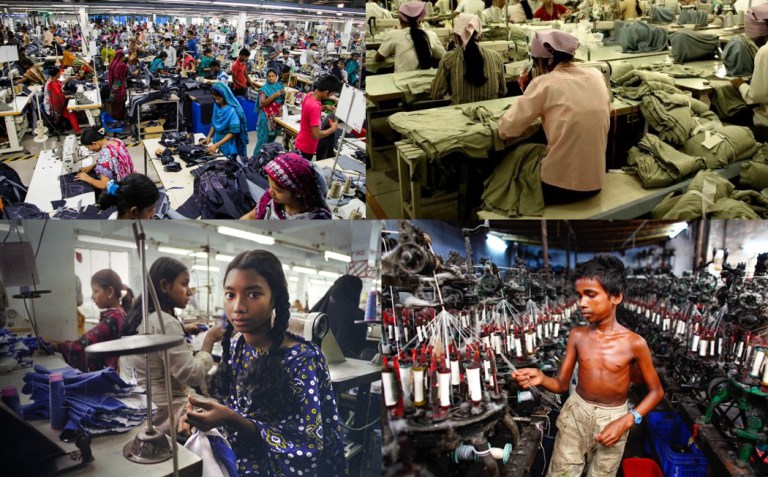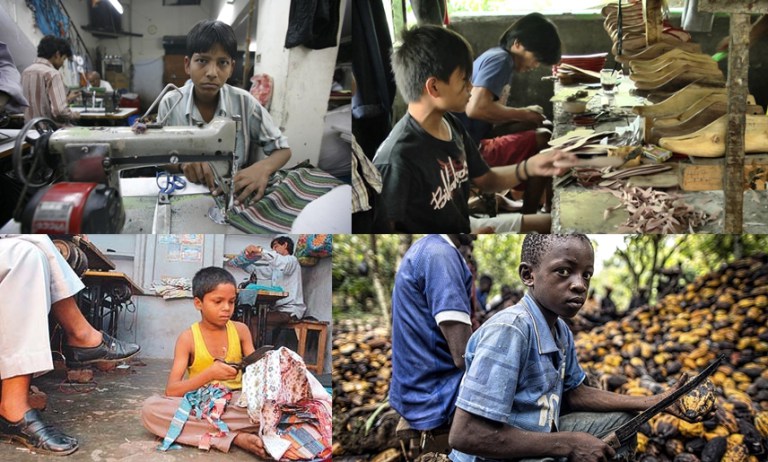(Português) Companhias suspeitas de financiarem a semi-escravidão em países subdesenvolvidos
ORIGINAL LANGUAGES, 9 Oct 2017
David Arioch | Jornalismo Cultural – TRANSCEND Media Service
29 set 2017 – Companhias que, de acordo com a organização Human Rights Watch, não fornecem informações claras sobre a origem de seus produtos, levantando suspeitas sobre o financiamento de sweatshops, ou seja, locais onde pessoas trabalham em más condições e por longas jornadas, em um regime de semi-escravidão. Das 72 companhias contatadas pela HRW, apenas 17 assinaram um documento se comprometendo em fornecer todas as informações sobre seus fornecedores a partir de dezembro deste ano.
Por enquanto, esta é a lista de companhias na mira da coalizão formada pela Clean Clothes Campaign, Human Rights Watch, IndustriALL Global Union, International Corporate Accountability Roundtable, International Labor Rights Forum, International Trade Union Confederation, Maquila Solidarity Network, UNI Global Union e Worker Rights Consortium:
Abercrombie & Fitch,
Adidas,
ALDI North,
American Eagle Outfitters,
Arcadia Group,
Armani,
Asics,
ASOS,
Benetton,
BestSeller,
C&A,
Canadian Tire,
Carrefour,
Carter’s,
Clarks,
Coles,
Columbia Sportswear,
Cotton On Group,
Debenhams,
Decathlon,
Desigual,
Dick’s Sporting Goods,
Disney,
Esprit,
Fast Retalling,
Foot Locker,
Forever 21,
G-Star Raw,
Gap,
H&M Group,
Hanesbrands,
Hudson’s Bay Company,
Hugo Boss,
Inditex,
John Lewis,
KiK,
Kmart Australia,
Levi Strauss,
LIDL,
Lindex,
Loblaw,
Mango,
Marks and Spencer (M&S),
Matalan,
Mizuno,
Morrison’s,
Mountain Equipment Co-op (MEC),
New Balance,
New Look,
Next,
Nike,
Patagonia,
Pentland Brands,
Primark,
Puma,
PVH Corporation,
Raph Lauren Corporation,
Rip Curl,
River Island,
Sainsbury’s,
Shop Direct,
Sports Direct,
Target Australia,
Target USA,
Tchibo,
Tesco,
The Childen’s Place,
Under Amour,
Urban Outfitters,
VF Corporation
Walmart,
Woolworths.
**********************************
Grandes companhias ajudam a financiar a exploração do trabalho infantil
Grandes companhias que têm ajudado a financiar a exploração do trabalho infantil em países subdesenvolvidos:
Nestlé,
H&M,
Phillip Morris,
Walmart,
Victoria’s Secret,
Gap,
Apple,
Nike,
Zara,
Urban Outfitters,
Aldo,
Primark,
Disney,
Forever 21,
Hershey,
Mars,
ADM,
Godiva,
Kraft Foods,
Cadbury,
Fowler’s Chocolate,
Starbucks, A
eropostale,
La Senza e
Toys R Us
De acordo com informações da International Labour Organization (ILO), 152 milhões de crianças trabalham em regime de semiescravidão no mundo todo. Desse total, 72,1 milhões de crianças são exploradas na África, 62,1 milhões na Ásia, 10,7 milhões nas Américas, 1,2 milhão no Oriente Médio e 5,5 milhões na Europa e na Ásia Central.
__________________________________________
 David Arioch é jornalista, pesquisador e documentarista. Trabalha profissionalmente há dez anos com jornalismo cultural e literário.
David Arioch é jornalista, pesquisador e documentarista. Trabalha profissionalmente há dez anos com jornalismo cultural e literário.
Go to Original:
DISCLAIMER: The statements, views and opinions expressed in pieces republished here are solely those of the authors and do not necessarily represent those of TMS. In accordance with title 17 U.S.C. section 107, this material is distributed without profit to those who have expressed a prior interest in receiving the included information for research and educational purposes. TMS has no affiliation whatsoever with the originator of this article nor is TMS endorsed or sponsored by the originator. “GO TO ORIGINAL” links are provided as a convenience to our readers and allow for verification of authenticity. However, as originating pages are often updated by their originating host sites, the versions posted may not match the versions our readers view when clicking the “GO TO ORIGINAL” links. This site contains copyrighted material the use of which has not always been specifically authorized by the copyright owner. We are making such material available in our efforts to advance understanding of environmental, political, human rights, economic, democracy, scientific, and social justice issues, etc. We believe this constitutes a ‘fair use’ of any such copyrighted material as provided for in section 107 of the US Copyright Law. In accordance with Title 17 U.S.C. Section 107, the material on this site is distributed without profit to those who have expressed a prior interest in receiving the included information for research and educational purposes. For more information go to: http://www.law.cornell.edu/uscode/17/107.shtml. If you wish to use copyrighted material from this site for purposes of your own that go beyond ‘fair use’, you must obtain permission from the copyright owner.
Read more
Click here to go to the current weekly digest or pick another article:
ORIGINAL LANGUAGES:

